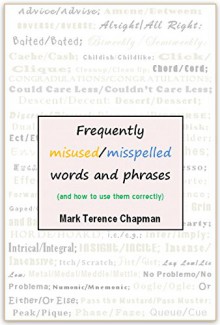From the author of the former Amazon #1 bestselling Military Sci-fi novel (My Other Car is a Spaceship). Do you write fiction, nonfiction, blog entries, business memos, emails, or anything else that others will read? Do you sometimes find yourself using the wrong word (such as discrete vs....
show more
From the author of the former Amazon #1 bestselling Military Sci-fi novel (My Other Car is a Spaceship).
Do you write fiction, nonfiction, blog entries, business memos, emails, or anything else that others will read? Do you sometimes find yourself using the wrong word (such as discrete vs. discreet)? Are you confused by similar words (such as to, too, and two; lay and lie; there, their, and they’re; or shined, shone, and shown)? Do you misspell common words (alright vs. all right, or ect. vs. etc.) and phrases (such as tow the line vs. toe the line)? Then this book is for you.
It explains in simple language the differences between hundreds of words and phrases that are frequently misused and misspelled, as well as rules for proper punctuation and capitalization, and other elements of English that often trip up the unwary writer. And it does so with frequent humor to keep it from becoming too dry. For example (unfortunately the Amazon sales page doesn't show the formatting):
Baited vs. Bated
Wrong: I waited with baited breath.
Right: I waited with bated breath.
Do your friends call you “fish-breath”? If not, then you wait with bated breath, which means “reduced, lessened, lowered in force.” The expression bated breath (using a short form of abated) refers to how someone almost stops breathing through awe, terror, anxiety, or extreme anticipation. Perhaps you waited with bated breath as he baited the hook.
and:
Dessert vs. Desert
Wrong: She wandered for days, lost in the dessert.
Right: She wandered for days, lost in the desert.
Unless she was eating the world’s largest hot fudge sundae, she was lost in a desert (an extremely dry place that supports only sparse vegetation), not a dessert (the final course of a meal).
and:
Peak vs. Pique vs. Peek
Wrong: You peaked my interest.
Right: You piqued my interest.
Peak, when used as a verb, means to reach the highest point of something. (“The Dow Jones peaked at 11,000 points.”) Pique, in this context, means to excite interest, or arouse an emotion. And, of course, peek means to glance quickly or furtively, or peep. You might peek at the mountain peak, which in turn piques your curiosity.
and:
Tact vs. Tack vs. Tactic
Wrong: I’m going to take a different tact on this problem.
Right: I’m going to take a different tack on this problem.
Right: I’m going to try a different tactic with this problem.
The phrase “taking a different tack” comes from nautical terminology meaning a course run obliquely against the wind in a zigzag fashion. So, taking a different tack means to try another approach or come at the problem from a different direction. Tact, on the other hand, is a sense of what’s appropriate, or a skill with delicate situations. A tactic is a plan or procedure to attain a goal. A person of tact, then, might try a different tack as a tactic for achieving victory.
Check out the Look Inside feature for hundreds of other examples.
P.S. This is a living document. The author updates it frequently. To receive all updates for free, simply make sure your Kindle account settings on Amazon have Automatic Updates enabled. (Go to Your Account, select Manage Your Content and Devices, scroll down to Automatic Book Updates, and click On.)
To find out more about the author's fiction and nonfiction books, go to his blog at http://tesserene.blogspot.com or his website: http://MarkTerenceChapman.com.
show less

